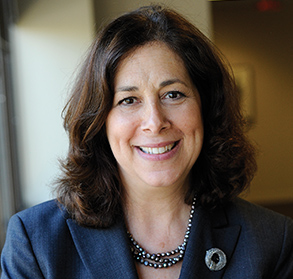11/08/2016
Deciding to Give
- Share This Story
Motivations for Giving May Evolve with Time

Carol F. Wolf, LISW, CFRE
Article reprinted with permission from Crain's Cleveland Business.
A close friend who is a cancer survivor sends an email asking you to sponsor her for a Run/Walk supporting an organization that provides services for cancer patients and their families. You are somewhat familiar with the charity, but have not supported it before. How long does it take to decide to make a donation? Most likely, you clicked on the link to her fundraising page and gave immediately. Will you continue your support annually? Will you include the organization in your estate plan? The annual gift takes thought, but the decision to make a testamentary gift takes much more consideration.
Most people who give charitably support several charities each year for different reasons. As noted, it may be as simple as a quick response to a friend’s request. It may involve a business obligation or an event one wants to attend. Deciding to write a check or click on a link once or even annually may not take much soul searching or self- reflection. In contrast, the decision to include a charitable organization in an estate plan may take years and involve others in the decision making process.
Often, tax benefit may begin charitable conversation, but as the discussion progresses, it is the person’s philanthropic intent and goals that will lead to an actual commitment. Experienced development professionals know that charitable gifts made solely for financial reasons often end with regret.
Testamentary gifts are usually much larger than charitable gifts that donors have made during their lifetimes. Therefore, it makes sense that the decision of what to give to whom should be taken very seriously and often requires professional advice. Individuals who give to many charities annually will probably include only one or two charities in their wills, demonstrating another reason for the serious consideration that a bequest requires. The charities included in an estate plan are those that the donor thinks of as family – an additional child whom they wish to support even after they have passed away.
Potential donors ponder several questions as they make charitable plans that "do good and feel good".
- What are my charitable priorities? In other words, what do I care most about? Perhaps human services, religion or education. And, education may mean supporting an inner city tutoring program to one person and donating a building on a college campus to another.
- What impact do I want my gift to have? Donors may wish to fulfill an existing need or help create a new and innovative program.
- Do I trust the organization? Donors need to feel that the organization receiving their bequest will use it as intended in a fiscally responsible manner. All this will happen long after the donors, and maybe their surviving family members are deceased. It is important that donors learn about the organization’s effectiveness, stability and experience with planned gifts. The relationship between the donor and key staff members including the CEO and development professionals is of utmost importance in establishing trust.
- How much control do I need/want over how my gift is used? Donors who want control over how their future gifts will be used are less likely to make unrestricted gifts, preferring designated or field of interest funds. Donors who require less control may prefer making a gift that may be used where it is needed most, usually determined by the organization’s current leadership.
- What form of recognition do I want? Donors must decide if they want to be recognized for their planned gifts at all. The desire for recognition may motivate donors to reveal testamentary intentions during their lifetimes. Charities appreciate knowing about expected gifts and donors may enjoy being part of the charity’s Legacy Society.
Once these questions are answered, donors may have a better idea of the organizations they wish to support. Next, deciding HOW to make the gift may involve a team of advisors including a financial professional, CPA, attorney, development professional and hopefully, family members. The most successful philanthropic plans include open communication between donors and the team of advisors, working together to help the donor achieve his or her personal philanthropic and financial goals. Charitable giving has been scientifically proven to improve health and quality of life. Russell James, Director of Graduate Studies in Charitable Planning at Texas Tech has a theory about the core reason for philanthropy. “Deep down in a person’s head, perhaps in the subconscious, there is something that drives a persona to seek meaning outside of themselves, and it often finds expression through charitable giving. Giving to help others and/or to a cause greater than one’s self gives meaning to our own lives”.
Perhaps that is the most influential factor as donors make their philanthropic decisions and all of the other details are secondary.
Carol Wolf is the Managing Director, Planned Giving and Endowments at the Jewish Federation of Cleveland.


Comments